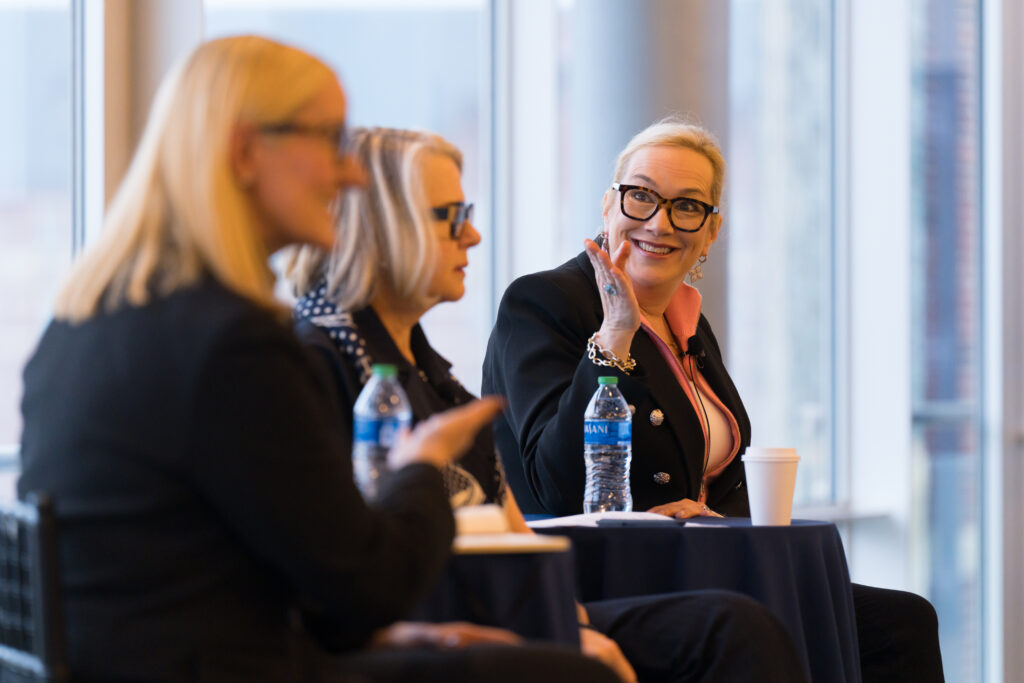Almost a decade ago, leaders at the George W. Bush Presidential Center in Dallas and the Clinton Presidential Center in Little Rock, Arkansas, were wrestling with the same idea: How could they bring diverse people together in a nonpartisan way to teach them about leadership?
Former Education Secretary Margaret Spellings, current CEO and President of the Bipartisan Policy Center and former President and CEO of the George W. Bush Presidential Center, had just gone to work for the new Bush Center.
“It occurred to me that we have three presidential libraries in Texas and one not too far away in Arkansas – and as it happens, two Democrats and two Republicans,” Spellings said. “I went to President Bush one day and told him about this idea and how we are all affiliated with universities and we would use presidencies as case studies in leadership. We would anchor these lessons in that period of history, which, really, the presidential centers are about the history as much as they are about an individual.”
Stephanie Streett, Executive Director of the Clinton Foundation, was having similar conversations with her team.
“We were talking amongst ourselves about some kind of nonpartisan opportunity to bring diverse people together, to really focus on solving problems,” Streett said. “We didn’t want it to be political. We didn’t want it to be all about training political leaders. We wanted to be bringing all sectors together.”
These initial conversations turned into the Presidential Leadership Scholars program, which convened its ninth cohort of Presidential Leadership Scholars for the first time in Washington, D.C., in January. In a discussion moderated by Holly Kuzmich, Senior Advisor to PLS, Managing Director of the Draper Richards Kaplan Foundation, and former Executive Director of the George W. Bush Institute, Spellings and Streett provided a unique glimpse into the genesis of PLS – now in its ninth year.
The gathering also offered valuable insights on leadership from the leaders’ experiences in the administrations of Presidents Bush and Clinton and gave the new Scholars the chance to forge new connections.
As Secretary Spellings said at the top of the discussion, one of the best pieces of professional advice she was ever offered came from a colleague who told her, “When you find a good boss, stick with them.” She said that’s precisely what she did with President Bush. Stephanie Streett, now in her 33rd year with the Clintons, expressed the same sentiment. She cites her family’s legacy of public service as a driving factor for her involvement with politics.
“I was, as a kid, always interested in politics and public service,” Streett said. My family had been involved in those roles in Arkansas for five or six generations, so it was kind of in my blood. I always knew I wanted to do something, whether it was run for office, or be behind the scenes. And over time I realized I liked [being] behind the scenes, and making it happen.”
The conversation also touched on the similarities and differences between the leadership styles of President Clinton and President Bush.
Streett described President Clinton’s inclusive and people-centric approach, emphasizing his love for storytelling and his commitment to gathering diverse opinions before making decisions, while Spellings reflected on President Bush’s clear principles, delegation skills, and his ability to maintain perspective even in challenging situations. The conversation shone a light on leadership and decision-making styles at the highest levels of power, emphasizing the importance of bipartisanship in effective leadership.
As this year’s Scholars embark on their PLS journey, the conversation was as a valuable foundation from which they will build on their own leadership journeys.

